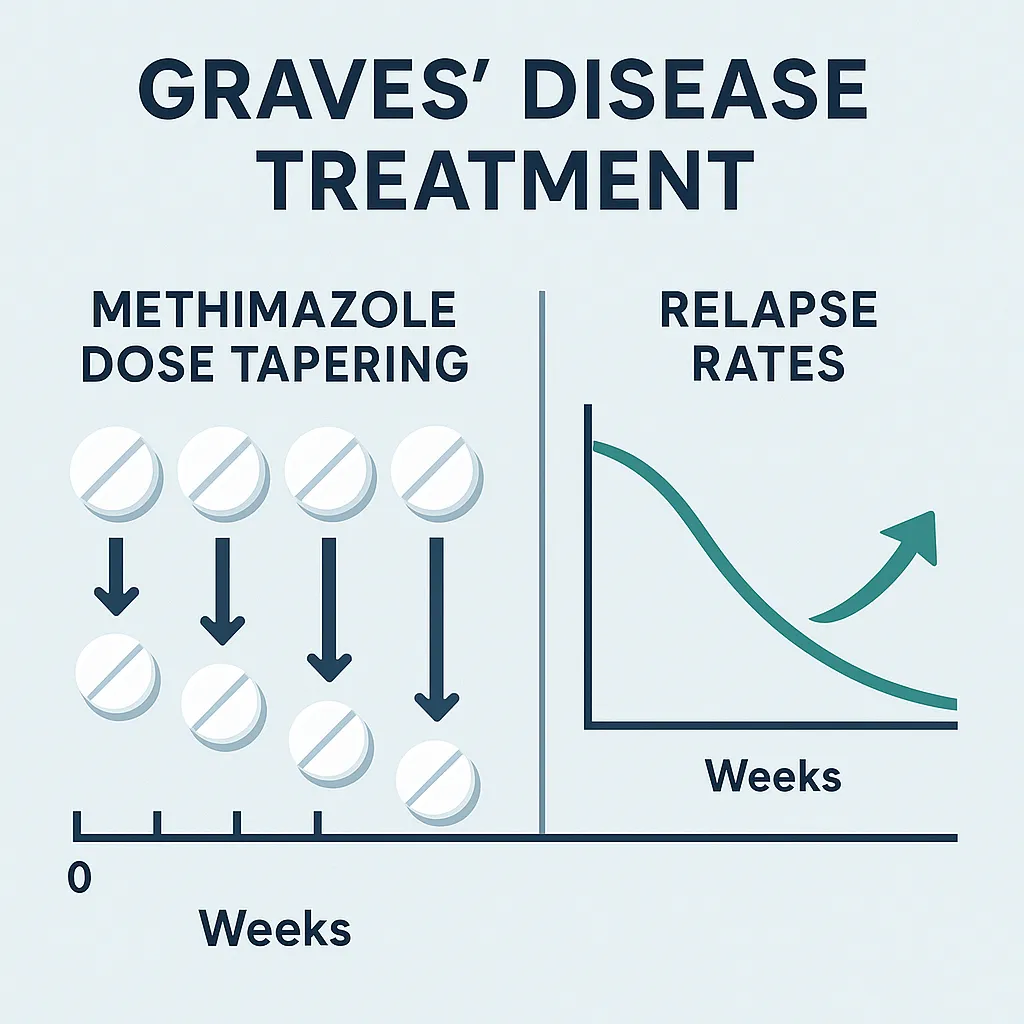Lower Methimazole Dose Before Discontinuation Cuts Graves’ Relapse Risk

Lead A retrospective Japanese study presented today shows that tapering methimazole to 1.25 mg/day or lower before stopping treatment significantly reduces Graves’ disease relapse rates at one year compared with higher doses.
Nut Graf The findings, unveiled at the 2025 American Thyroid Association Annual Meeting, suggest that adopting a tailored tapering strategy could reshape clinical guidelines and improve long-term remission for patients with hyperthyroidism due to Graves’ disease.
Key Findings
- Patients tapered to 1.25 mg/day had a 7.1% relapse rate at one year, versus 13.8% for those on 2.5 mg/day.
- Those taking < 1.25 mg/day experienced only a 2.6% relapse rate.
- Gradual dose reduction may stabilize immune reactivation and support durable remission.
Study Details The cohort study at Kuma Hospital in Kobe, Japan, reviewed 4,352 newly diagnosed Graves’ patients treated with methimazole (MMI) between 2008 and 2024. Participants were grouped by final maintenance dose before discontinuation:
2.5 mg/day (n=3,523) - 13.8% relapse
1.25-< 2.5 mg/day (n=526) - 13.1% relapse
1.25 mg/day (n=227) - 7.1% relapse
< 1.25 mg/day (n=76) - 2.6% relapse
Clinical Implications Endocrinologists may consider prescribing or developing lower-dose formulations-particularly 1.25 mg tablets-to optimize tapering. While broader availability of sub-5 mg tablets could facilitate this strategy, further research is needed to confirm mechanisms behind improved outcomes.
Next Steps Researchers call for prospective trials to validate these retrospective findings and explore the immunological basis of dose-dependent relapse risk. If confirmed, international guidelines may endorse minimal-dose tapering as standard practice to reduce Graves’ disease recurrence.
Categories
Autos and vehicles Beauty and fashion Business and finance Climate Entertainment Food and drink Games Health Hobbies and leisure Jobs and education Law and government Other Politics Science Shopping Sports Technology Travel and transportationRecent Posts
Tags
Archives
08/19/2025 (3) 08/20/2025 (40) 08/21/2025 (27) 08/22/2025 (22) 08/23/2025 (4) 08/24/2025 (21) 08/25/2025 (30) 08/26/2025 (24) 08/27/2025 (29) 08/28/2025 (16) 08/29/2025 (9) 08/30/2025 (13) 08/31/2025 (17) 09/01/2025 (167) 09/02/2025 (124) 09/03/2025 (149) 09/04/2025 (112) 09/05/2025 (72) 09/06/2025 (169) 09/07/2025 (162) 09/08/2025 (150) 09/09/2025 (176) 09/10/2025 (194) 09/11/2025 (194) 09/12/2025 (186) 09/13/2025 (207) 09/14/2025 (159) 09/15/2025 (175) 09/16/2025 (198) 09/17/2025 (196) 09/18/2025 (196) 09/19/2025 (207) 09/20/2025 (129) 09/21/2025 (4)